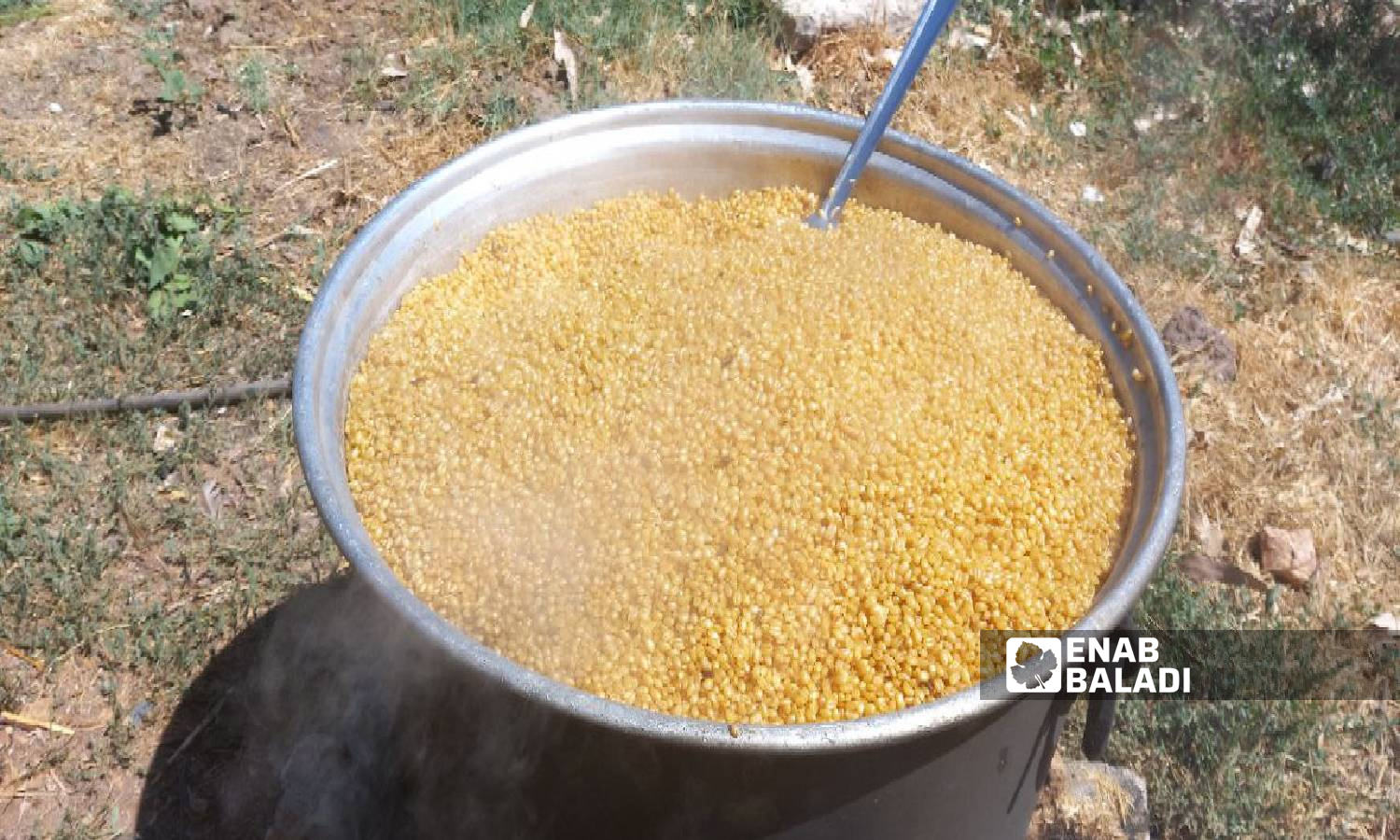



Daraa – Halim Muhammad
The southern Daraa governorate witnessed an increased demand for locally-made bulgur following the end of the wheat harvest season in June.
A number of Daraa residents attributed the motive for storing large quantities of bulgur to being an alternative staple for rice, whose price is repeatedly increased, and because the bulgur is the main component of al-Mlaihi, the popular and traditional meal for the residents of southern Syria and northern Jordan as well.
Iman, 31, from the countryside of Daraa, told Enab Baladi that she has prepared additional quantities of bulgur for this year due to the high prices of rice, pasta, and legumes, which are essential ingredients in every lunch.
Iman usually stores about 25 kg of bulgur every year, but she has doubled the amount this year to 50 kg, saying that “bulgur will become the main food for most days of the year, in light of the increase in the prices of basic materials in the local market.”
The prices of some good types of long rice reach about 12,000 SYP per kilo, and the price of one kilo of rice of the short type ranges between 4000 and 7000 SYP.
The price of a bag of pasta (weighing 500 grams) reaches about 3000 SYP.
The exchange rate of the Syrian pound against the US dollar has reached 4,200 pounds per dollar, according to the SP-Today website, which specializes in currency rates.
Mohammad, 65, a resident of the town of Tafas in the western countryside of Daraa, told Enab Baladi that the making of bulgur is one of the ancient rituals that Daraa people still preserve, as it is mainly included in “Mansaf al-Mlaihi,” the famous meal in southern Daraa region.
Mohammad, who preferred not to reveal his full name for security reasons, explained that the residents’ fear of the disruption of flour and food as a result of international tensions, especially after the Russian war on Ukraine, prompted them to stock up on various types of grains, including bulgur.
Umm Mahmoud, in her fifties, put the wheat in a large bowl and poured water on it to start the process of cleaning and removing grain husks, dust, and straw that floats on the water.
“In the old days, the grain cleaning used to have different rituals, where more than one family gathers on the river bank where women cooperate in the first step of making burglar, which is one of the basic staples of Houran supplies,” Umm Mahmoud told Enab Baladi.
In the second phase, the boiling process begins in a huge pot filled with wheat and water, according to what Umm Mahmoud explained, considering that boiling wheat is one of the most difficult stages of preparing bulgur currently, as it cannot be boiled on gas due to the loss of subsidized gas and the high price of gas on the black market, which forced the residents to boil it on the firewood.
Once boiled, the wheat is removed from the pot and poured into pots, then carried to the rooftops, where it remains exposed to the sun for about a week.
After a week, it is packed in bags and taken to the mill for grinding, after which it is ready for storage.
The bulgur industry was almost completely absent during the years of the opposition’s control of the southern region due to the presence of bulgur in the food rations provided by the World Food Programme (WFP), which used to reach most of Daraa’s residents on a monthly basis.
The work of humanitarian organizations has shrunk in southern Syria since the regime took control in July 2018, just as the distribution of food baskets in the province became limited to the Syrian Arab Red Crescent (SARC), which does not distribute bulgur in the basket it provides to the residents.
All of these reasons pushed the people of Daraa to prepare the winter food supplies from their crops, as they did not only store bulgur but also wheat for fear of a sudden disruption of flour, in which case, the families would resort to grinding wheat and using it if subsidized flour is suspended.
if you think the article contain wrong information or you have additional details Send Correction